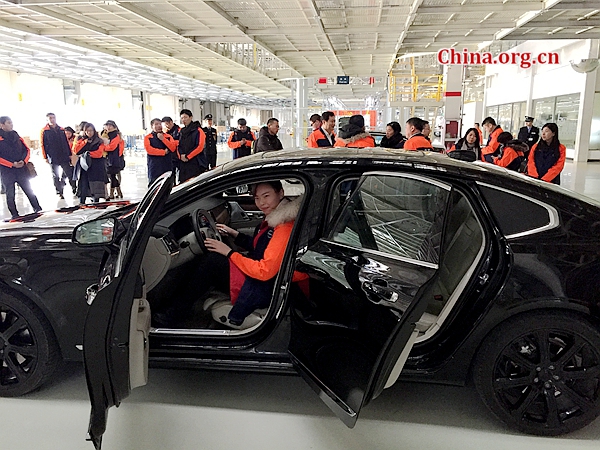Heilongjiang on the road to transformation
- By Christopher Georgiou
 0 Comment(s)
0 Comment(s) Print
Print E-mail China.org.cn, January 26, 2017
E-mail China.org.cn, January 26, 2017
|
National and international media group tour new Volvo factory in Daqing, Heilongjiang Province, on Jan. 11, 2016 [By Christopher Georgiou / China.org.cn ] |
Both central and local governments have implemented various policies to transform China's northeast. These can be found in the "Several Opinions on Comprehensive Revitalization of the Northeast Old Industrial Base" issued in April 2016 by the CPC Central Committee together with the State Council.
Chinese President Xi Jinping has outlined the need for supply-side reform and deepening the role of the market. This is especially applicable to Heilongjiang, with its heavy overcapacity in coal and steel and a recent slowdown in oil production.
In terms of human capital, basic laborers are abundant but the coal industry suffers from a lack of skilled technicians. Emigration and the one-child policy, particularly effective in the province due to the heavy presence of state enterprises, have left an aging and dwindling population, helping to create a "brain drain."
Comparison to U.K.
The U.K., the first nation to undergo an industrial revolution, has also faced the challenges of de-industrialization. Interestingly the major industrial heartlands were also in the north of England. However, after World War II, and especially from the 1960s to the 1990s, these once proud cities suffered severely from the collapse of industry.
To this day, local and central governments are working on how to tackle the issues of transforming and developing the local economies and increasing employment. In fact, Chinese cities have decided to learn from their U.K. counterparts through activities such as city-to-city twinning. For instance, Harbin is twinned with the northern English town of Sunderland.
Over the last century, the U.K. has been a very centralized political union. Revitalization efforts have revolved around devolution of power.
Recently, the central government has given with one hand (power) and taken with the other (decreased spending), in order to stimulate the northern cities, reduce dependency on central government funding and act according to market principles. Moreover, they are encouraging cities and townships to join forces and work together to pool resources for transport and general economic development. The aim is to create a northern powerhouse of "city-regions and clusters" to rival London and the southern economies.
The Chinese political system is already rather decentralized, with local mayors and provincial governors able to implement local policies to encourage economic development. But what the province needs is brave and bold leadership to go through some years of pain in order to restructure the industries.
This will involve letting go of industries that are not adding value to the economy and focusing on sectors that are. This may involve huge job losses in the coal, steel and oil industries and other state owned companies that are in debt. When former U.K. Prime Minister Margaret Thatcher closed all the coal mines and shifted to foreign imports, it caused severe pain to a huge number of families.
The debate in the U.K. remains open on Thatcher's policies. But many say she was decisive and brave to take the bitter medicine and cause pain in order to smooth the economic transformation. If China wishes to transform the economy and invest in clean energy while limiting its reliance on coal and reducing air pollution, it will produce medium-term unemployment in the northeast.
The overcapacity in the coal and steel sectors are damaging to global and Chinese industries. The construction boom in China no longer requires such high amounts of construction materials and their related supplies. Selling land to construction companies is not sustainable and leads to overcapacity in the housing market, such as in the city of Daqing.







